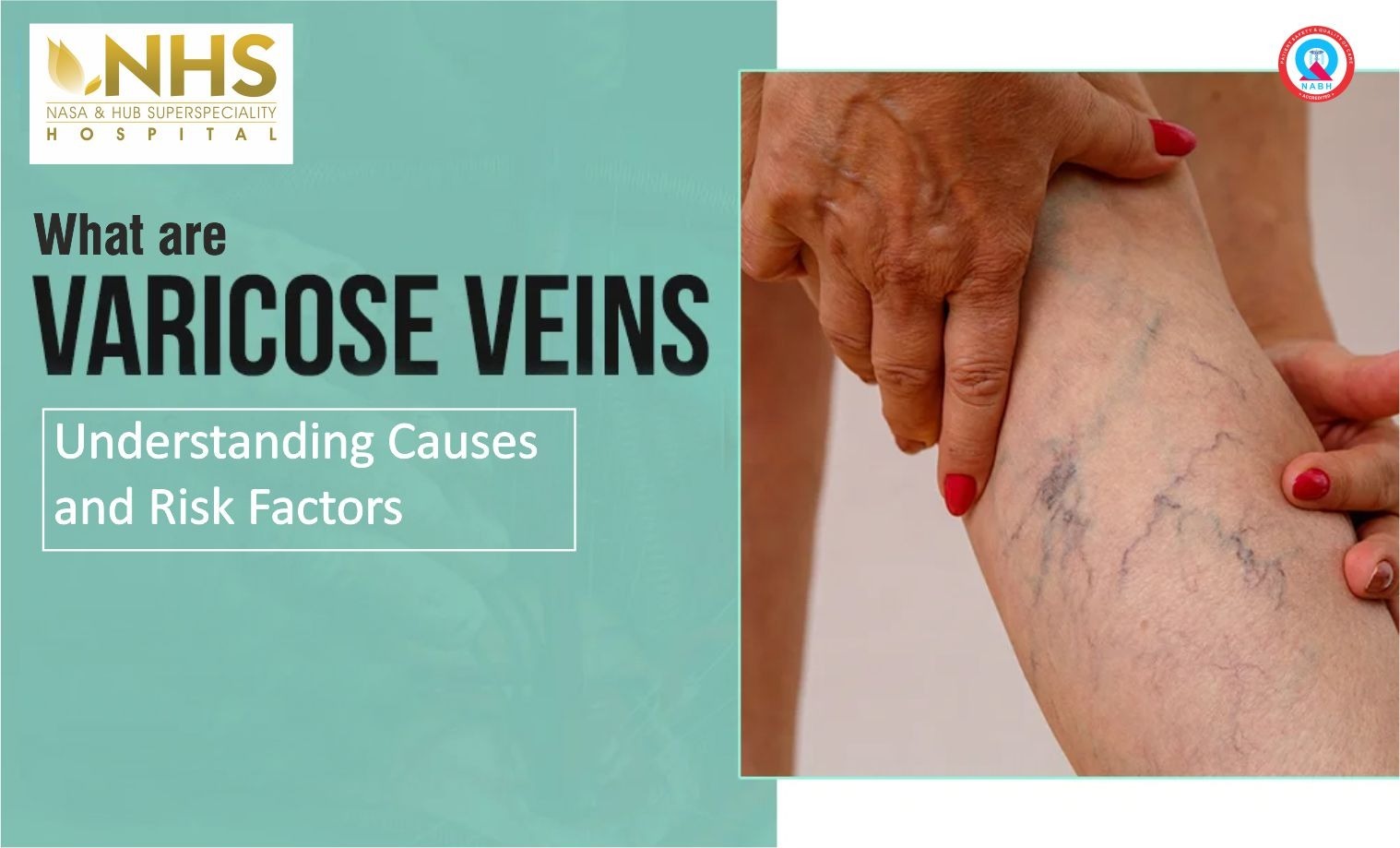
What Are Varicose Veins? Understanding Causes and Risk Factors
Varicose veins are a common yet often misunderstood condition that affects millions of people worldwide. They may appear as swollen, twisted, or bulging veins, most often seen on the legs. While many view them as a cosmetic concern, varicose veins can also be a sign of underlying circulatory issues that should not be ignored. At NHS Hospital, we focus on creating awareness and providing the most effective treatments, helping patients regain confidence and comfort in their daily lives.
Under the guidance of Dr Narender Paul (Senior General and Laparoscopic Surgeon), who has 15+ years of experience, our patients benefit from accurate diagnosis, personalised treatment, and the support of an experienced team. With access to the latest machinery and treatment options, we are committed to delivering world-class vascular care.
What Exactly Are Varicose Veins?
Varicose veins occur when the valves inside the veins—responsible for maintaining one-way blood flow back to the heart—become weak or damaged. Instead of flowing upwards, blood begins to pool within the vein, causing it to enlarge and appear twisted under the skin’s surface.
While varicose veins can develop in any superficial vein, they are most common in the legs and feet. This is because standing and walking put extra pressure on the veins in the lower body.
Causes of Varicose Veins
There is no single cause of varicose veins, but several contributing factors increase the likelihood of developing them:
- 1. Faulty Valves: Healthy veins contain small valves that open and close to keep blood moving towards the heart. If these valves weaken, blood flows backwards, accumulating in the vein and leading to varicose veins.
- 2. Weakened Vein Walls: Over time, the walls of veins can lose elasticity, making them less able to handle blood flow. This structural weakness contributes to vein enlargement and twisting.
- 3. Genetics: A family history of varicose veins is a strong risk factor. If your parents or grandparents had them, you are more likely to develop them too.
- 4. Pregnancy: During pregnancy, blood volume increases to support the growing baby. At the same time, hormonal changes relax blood vessel walls. Both factors make pregnant women more prone to varicose veins.
- 5. Ageing: As we age, our veins naturally lose strength and elasticity. The valves may not function as effectively, which is why varicose veins are more common in older adults.
- 6. Lifestyle and Occupation: Jobs that require long hours of standing or sitting—such as teaching, nursing, or office work—place extra strain on the veins in the legs. A sedentary lifestyle and lack of exercise also contribute to poor circulation.
Risk Factors
- Gender: Women are more likely to develop varicose veins due to hormonal influences.
- Obesity: Excess weight puts additional pressure on the veins.
- Multiple Pregnancies: Women who have had several pregnancies have a higher risk.
- History of Deep Vein Thrombosis (DVT): Previous vein problems can increase the chances.
- Lack of Physical Activity: Poor circulation due to inactivity is a significant risk factor.
Symptoms Beyond Appearance
While many notice varicose veins because of their visible appearance, they often bring uncomfortable symptoms, such as:
- Aching or heaviness in the legs
- Swelling around the ankles or calves
- Burning or throbbing sensation
- Restlessness, especially at night
- Skin discolouration around the veins
In severe cases, varicose veins may lead to complications such as ulcers, bleeding, or blood clots, which require prompt medical attention.
Treatment Options at NHS Hospital
Thanks to medical advancements, varicose vein treatment has moved beyond traditional surgery. At NHS Hospital, under the expert care of Dr Narender Paul, patients have access to the latest treatment techniques that are minimally invasive, safe, and highly effective.
Available treatments include:
- Endovenous Laser Treatment (EVLT): A laser fibre is used to close off the damaged vein.
- Radiofrequency Ablation (RFA): Heat is used to seal the vein and redirect blood flow.
- Sclerotherapy: A special solution is injected to collapse smaller varicose veins.
- Surgical Options: In more advanced cases, surgical removal of affected veins may be considered.
With the latest machinery and the support of an experienced team, procedures are carried out with precision, ensuring faster recovery and minimal discomfort for patients.
Why Choose Dr Narender Paul at NHS Hospital?
- Proven Expertise: With 15+ years of experience, Dr Narender Paul (Senior General and Laparoscopic Surgeon) has successfully treated numerous patients with varicose veins and related vascular conditions.
- Personalised Care: Each patient receives a tailored treatment plan designed to suit their specific condition and lifestyle.
- Advanced Technology: Our hospital is equipped with the latest machinery, offering world-class diagnostic and treatment facilities.
- Compassionate Team: Our experienced team ensures continuous support before, during, and after treatment, focusing on patient comfort and care.
Final Thoughts
Varicose veins may begin as a cosmetic concern but can progress into a serious health issue if ignored. Recognising the causes, understanding the risk factors, and seeking timely medical advice are essential steps in maintaining vascular health.
At NHS Hospital, with the guidance of Dr Narender Paul (Senior General and Laparoscopic Surgeon), patients are assured of expert consultation, accurate diagnosis, and access to the latest treatment options. Supported by an experienced team and state-of-the-art facilities, our goal is to ensure every patient enjoys healthier, pain-free living.
